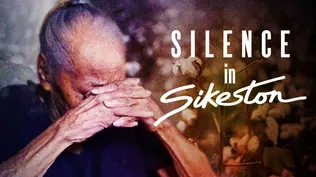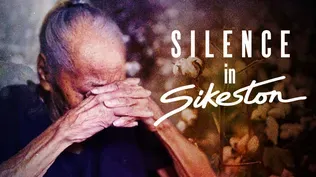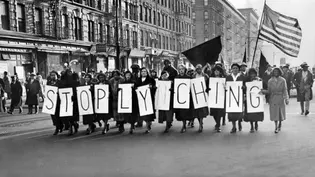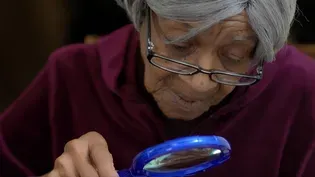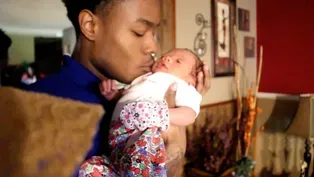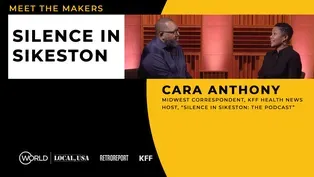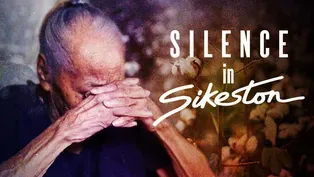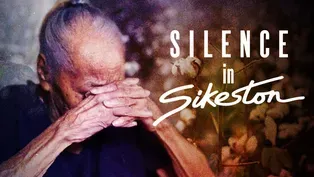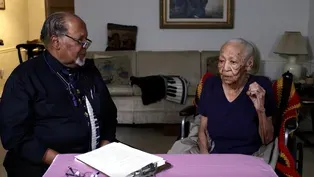
Silence in Sikeston | Beyond the Lens with Cara Anthony
Clip: Season 8 Episode 12 | 8m 12sVideo has Closed Captions
Journalist Cara Anthony reveals a piece of family history that parallels SILENCE IN SIKESTON.
Cara Anthony talks about SILENCE IN SIKESTON and the exploration of health - physical, mental and emotional - when trauma lives in the body. The KFF Health News Midwest correspondent shares how working on the project revealed a piece of family history that parallels the racial violence and silence seen and talked about in the film and podcast.
Funding for Silence in Sikeston provided by the Ford Foundation. Funding for Local, USA provided by the Corporation for Public Broadcasting, John D. and Catherine T. MacArthur Foundation and Wyncote Foundation.

Silence in Sikeston | Beyond the Lens with Cara Anthony
Clip: Season 8 Episode 12 | 8m 12sVideo has Closed Captions
Cara Anthony talks about SILENCE IN SIKESTON and the exploration of health - physical, mental and emotional - when trauma lives in the body. The KFF Health News Midwest correspondent shares how working on the project revealed a piece of family history that parallels the racial violence and silence seen and talked about in the film and podcast.
How to Watch Local, USA
Local, USA is available to stream on pbs.org and the free PBS App, available on iPhone, Apple TV, Android TV, Android smartphones, Amazon Fire TV, Amazon Fire Tablet, Roku, Samsung Smart TV, and Vizio.
Buy Now
Providing Support for PBS.org
Learn Moreabout PBS online sponsorship(chorus humming) - [Cara] As a journalist, I have been so focused on everyone else's story, (sirens blaring) but I really didn't know my own story.
My dad held onto this painful story for a decade before he shared it with me.
All those years, kept it to himself.
I called my Aunt B and told her about what my dad had found.
- [Family Member] I am heartbroken.
I think there's something in our DNA that still makes us scared to talk about it.
I need for us to look at it.
- That is what I'm doing.
I'm Cara Anthony.
I'm a health reporter.
I cover the physical and emotional ways racism impacts our health, including the silence around violence and racism.
(tense music) One of my favorite quotes is something that Jay-Z said in a "New York Times" interview, how you cannot heal what you won't reveal, and that became my mantra as we pursued this story.
So if we don't talk about our trauma, then how can we heal?
How can we move on?
- [Commentator] All towns have good stuff along with the bad stuff, and unfortunately, something terrible happened here.
(train horn blaring) If you were to ask anybody in their 20s, maybe 30s, about the lynching of Cleo Wright, probably couldn't tell you.
But history can't be erased.
Even though that was over 70 years ago, the story needs to be told.
- We also make a connection between lynching and modern-day police killings.
And so we also look at the case of Denzel Taylor.
He's a young Black father who was shot and killed by Sikeston Police in 2020.
I've been asking through this entire journey, is the lynching era really over?
Racial violence did not end when the lynching era ended.
Black people in this country are still trying to figure out how to stay safe, how to keep their families safe.
- Denzel was not armed.
(sirens blaring) He didn't pose a threat towards the police officers at all.
(wind chime ringing) - [Rhonda] After you all saw the lynching that happened, did you and your friends talk about that?
- [Mable] No, we didn't talk about it, no, uh-uh.
My daddy told us not to have nothing to be saying about it.
- [Rhonda] Oh, 'cause your dad said that.
- [Mable] That's right.
- "Forget it."
"Don't talk about it."
Suffering in silence is not just a thing that people say.
Violence that can come with racism can make you sick, and it can be even harder when we cannot talk about these things.
If you don't deal with the emotional stuff, it can live in your body.
- [Commentator] Arthritis, fibromyalgia, high blood pressure.
- And ripple through families as intergenerational trauma.
That makes me wonder about my dad's high blood pressure, my mom's chronic pain, about my own trouble sleeping.
Well, why aren't we having these discussions?
Is it because of fear of retaliation maybe back then?
Does it have something to do with shame now?
You know, these are all things that my father and I and other family members now are grappling with.
Okay, Dad, come over here.
I wasn't sure if visiting a cotton field was a good idea.
Almost everyone in my family was antsy.
When we pulled up to that sea of white, I felt like a stranger to the soil.
My daughter Lily, then five, happily touched cotton for the first time.
My dad posed for a few photos.
We were standing there, three generations strong, on the edge of a cotton field, 150 miles away from home and decades removed from our own past.
And so I started having conversations with my father, who is really our family historian.
He's the reason why I'm a storyteller.
So my dad told me the story of my Uncle Leemon.
He pulled up the death certificate on his computer.
Leemon was 29.
- [Family Member] It said, "Shot by police, resisting arrest."
I never heard this in my whole life.
I thought he died in an accident.
Then item 21, it lists homicide.
- Okay, okay.
That's a lot.
I need to pause.
The same kind of racial violence I had been reporting on in Sikeston had happened to someone in my own family.
First I was surprised.
Then the surprise turned into grief for that missing part of our family.
For me, I'll have to figure out how I'll share that story with my daughter one day.
I know she's not ready to to hear about it yet, but I do think that it goes back to the Black joy and Black pain.
You know, it's very important for us to talk about both.
- [Interviewer] Where were you at when it happened?
- [Mable] Standing on the porch.
We heard all the commotion, so me and my sister got on the porch and looked out, and we saw 'em dragging.
- [Cara] I don't know how you move on from something like the lynching of Cleo Wright, but breaking the silence is a step.
And at 97, Ms. Mable did just that.
She spoke to me.
She trusted me enough to talk about it.
Afterward, she said she felt lighter.
- [Mable] That's right, uh-huh.
So it made me feel much better after getting it out.
♪ Glory, hallelujah ♪ ♪ Since I laid my burden down ♪ ♪ Laid my burden down ♪ - [Cara] I grew up singing that song, but before that moment, it was just another hymn in church.
When Miss Mable sang it, it became something else.
It sounded more like an anthem, a call to acknowledge what we've been carrying with us in our bodies and minds and to know it's possible to talk about it and maybe feel lighter.
♪ Since I laid my burden down ♪ - [Cara] Racism is heavy, and it's making Black people sick, hives, high blood pressure, heart disease, inflammation, and struggles with mental health.
To lay those burdens down, we have to name them first.
- [Crowd] Black lives Matter.
Black lives matter.
Black lives matter.
Black lives matter.
- [Cara] Our conversation took place when activists around the world were speaking out about racial violence, shouting names and protesting for change, but no one had done that for my uncle.
My dad seemed to be the only one holding space for my Great Uncle Leemon, a name that was no longer spoken.
I wasn't thinking about my great uncle when I first packed my bags for rural Missouri to tell stories about other Black families, but my dad was holding on to Leemon's story.
Now, I say each of their names, Cleo Wright, Denzel Taylor, (tense music) Leemon Anthony.
♪ When I lay ♪ ♪ My burdens down ♪ ♪ Will I find ♪ ♪ My way out ♪ ♪ So I wait ♪ ♪ And I pray ♪ ♪ That someone ♪ ♪ Is finding me ♪
Silence in Sikeston | Before Lynching Became a Crime
Video has Closed Captions
Before the death of Cleo Wright in 1942, lynching was never prosecuted as a federal crime. (56s)
Silence in Sikeston | In the Aftermath of Trauma
Video has Closed Captions
Sikeston residents share how they had to live following the lynching of Cleo Wright. (56s)
Silence in Sikeston | Love & Grief for a Young, Black Father
Video has Closed Captions
A mother talks about her son's life in Chicago and Sikeston, MO before his death by police. (59s)
Silence in Sikeston | Meet the Makers
Video has Closed Captions
A conversation about the film and podcast and what they examine and expose about silence and health. (16m 10s)
Video has Closed Captions
How a lynching and police killing 78 years apart haunt the rural community of Sikeston, Missouri. (30s)
Video has Closed Captions
How a lynching and police killing 78 years apart haunt the rural community of Sikeston, Missouri. (1m 17s)
Silence in Sikeston | Witnesses to a Lynching
Video has Closed Captions
Two residents recall the day they, as young children, witnessed the lynching of Cleo Wright in 1942. (59s)
Providing Support for PBS.org
Learn Moreabout PBS online sponsorshipFunding for Silence in Sikeston provided by the Ford Foundation. Funding for Local, USA provided by the Corporation for Public Broadcasting, John D. and Catherine T. MacArthur Foundation and Wyncote Foundation.
